
"Somebody to Love" is a rock song that was written by Darby Slick. It was originally recorded by The Great Society, and later by Jefferson Airplane. Rolling Stone magazine ranked Jefferson Airplane's version No. 274 on their list of the 500 Greatest Songs of All Time.

"Come See About Me" is a 1964 song recorded by the Supremes for the Motown label.
"Ebb Tide" is a popular song, written in 1953 by the lyricist Carl Sigman and composer Robert Maxwell. The song's build up is to illustrate the ocean waves coming in and out to and from the shores, due to the ebb tides.

"Please Mr. Postman" is a song written by Georgia Dobbins, William Garrett, Freddie Gorman, Brian Holland, and Robert Bateman. It is the debut single by the Marvelettes for the Tamla (Motown) label, notable as the first Motown song to reach the number-one position on the Billboard Hot 100 pop singles chart. The single achieved this position in late 1961; it hit number one on the R&B chart as well. "Please Mr. Postman" became a number-one hit again in early 1975 when the Carpenters' cover of the song reached the top position of the Billboard Hot 100. "Please Mr. Postman" has been covered several times, including by the English rock group The Beatles in 1963.
"Pretend" is a popular song, written in 1952 by Dan Belloc, Lew Douglas, Cliff Parman and Frank Levere.
"Take Good Care of My Baby" is a song written by Carole King and Gerry Goffin. The song was made famous by Bobby Vee, when it was released in 1961.

"Hey Ladies" is a song by American hip hop group the Beastie Boys, featured on their album Paul's Boutique. It was the album's only charting single, hitting #36 on the Billboard Hot 100. It is also the first single in history to chart in the Top 20 of both the Billboard Hot Rap Singles and Modern Rock Tracks charts, hitting #10 on the former and #18 on the latter.
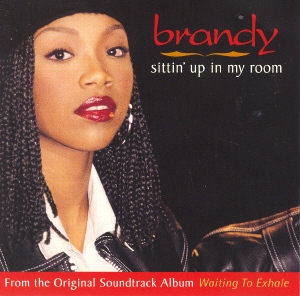
"Sittin' Up in My Room" is a song by American recording artist Brandy Norwood. It was written and produced by Babyface and recorded by Norwood for the soundtrack of the 1995 film Waiting to Exhale, starring Whitney Houston and Angela Bassett. The track was one out of five singles the album spawned and reached number two on the US Billboard Hot 100, becoming Norwood's most successful single on that particular chart up to that point. It is of note that the characteristic bass intro is a replica of the famous riff performed by bassist Larry Graham, of Sly and the Family Stone, on their hit "Thank You ", and its remix featuring LL Cool J contains a sample of "Haven't You Heard" by Patrice Rushen.
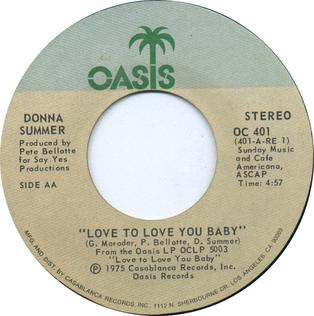
"Love to Love You Baby" is a song by American singer Donna Summer from her second studio album Love to Love You Baby (1975). Produced by Pete Bellotte, and written by Italian musician Giorgio Moroder, Summer, and Bellotte, the song was first released as a single in the Netherlands on June 1975 as "Love to Love You" and then released worldwide on November 1975 as "Love to Love You Baby". It became one of the first disco hits to be released in an extended form.
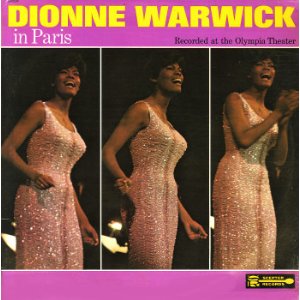
Dionne Warwick in Paris is Dionne Warwick's sixth album, and was released in 1966 on Scepter Records. It was recorded during Warwick's five-week engagement at the Paris Olympia in January 1966 and was released shortly after the tour was completed. The LP was issued as number 534 in the Scepter Catalog. The liner of this LP is pink with three pictures of Warwick side-by-side, not unlike the Make Way for Dionne Warwick album two years earlier.

"Baby, I Love Your Way" is a song written and performed by English singer Peter Frampton. It was released in September 1975 and was first featured on Frampton's 1975 album, Frampton. The song segues from the previous track "Nassau".

"Blame It on the Boogie" is a song originally released in 1978 by English singer-songwriter Mick Jackson, and also The Jacksons. It was later covered by numerous other artists. The song was performed on Musikladen, Aplauso, Sonja Goed Nieuw's Show and ABBA Special: Disco in the Snow Part 1.

"Song Sung Blue" is a 1972 hit song written and recorded by Neil Diamond, inspired by the second movement of Mozart's Piano Concerto #21. It was released on Diamond's album, Moods and later appeared on many of Diamond's live and compilation albums.

"Message to Michael" is a song written by Burt Bacharach and Hal David, that has been a hit for several different artists under several different titles. The song was first recorded as "Message to Martha" by Jerry Butler in 1962. In 1964, singer Lou Johnson had a minor US hit with the song, with the title "Kentucky Bluebird". The British singer Adam Faith also recorded the song as "A Message to Martha " in 1965, and had a substantial hit with it in the UK Singles Chart, reaching No. 12. Exactly the same recording was issued in Australia as "Message to Martha", where it was a No. 15 hit for Faith. Americans are probably most familiar with the 1966 Top Ten version by Dionne Warwick, which was titled "Message To Michael".
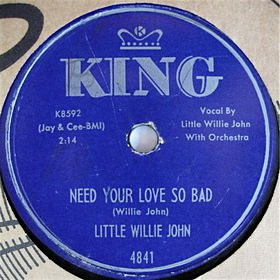
"Need Your Love So Bad", sometimes known as "I Need Your Love So Bad", is a blues song first published and recorded by Little Willie John in 1955. It was written by Mertis John Jr., Little Willie John's older brother.
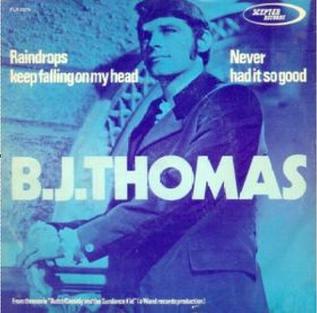
"Raindrops Keep Fallin' on My Head" is a song written by Hal David and Burt Bacharach for the 1969 film Butch Cassidy and the Sundance Kid. It won an Academy Award for Best Original Song. David and Bacharach also won Best Original Score. The song was recorded by B. J. Thomas in seven takes, after Bacharach expressed dissatisfaction with the first six. In the film version of the song, Thomas had been recovering from laryngitis, which made his voice sound hoarser than in the 7-inch release. The film version featured a separate vaudeville-style instrumental break in double time while Paul Newman performed bicycle stunts.
"Sure As I'm Sittin' Here" is a song written and originally performed by John Hiatt. Hiatt released the original version of the song as a single in February, 1974, and included it on his debut album Hangin' Around the Observatory. Hiatt's version of "Sure As I'm Sittin' Here" failed to chart.














